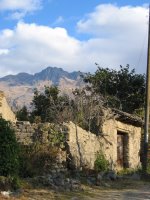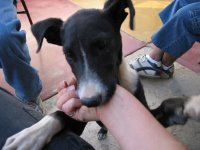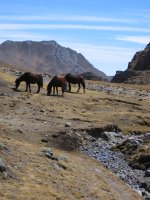
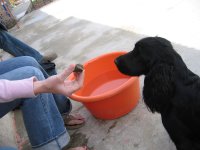
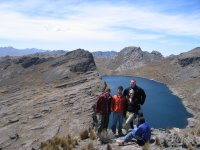
Someone wrote an article in the Peace Corps Bolivia newsletter about keeping perspective. As in, even though we are in Bolivia and getting sick happens, it is not okay to shit in your pants. Don’t judge us, this is easy to forget when you have amoebas, giardia, or salmonella. And honestly, there’s a lot that’s not okay here. No one uses trashcans. Ever. Some Bolivians’ besito greetings are really besito-not-so-ito. My host family’s dog plays fetch with rocks. There is a lynched dummy hanging in town to show what happens to thieves. It. Is. Not. O. K.
But it becomes ok pretty quickly. For example, transportation. At the local level it’s by taxi-trufi, trufi, or micro. These are cars, mini-vans, or small buses, respectively, that drive a set route and stop whenever someone yells “Pare/parada/la esquina por favor!”. All involve cramming three more people than is humanly possible into a torn up vehicle. But it’s easy to learn and cheap, < $0.25 a pop. Pretty soon you don’t even think about curling up on a spare tire in a taxi-trufi with 10 other people. When the micro is so full that the door doesn’t close, just make sure you have a good handhold. The two inches between your leg and the wall is DEFINITELY enough room to squeeze in someone’s cho bag, cake box, or child.
Trufis are a lot sturdier than they look. Dan’s host dad drives one and took us to Tunari National Park last weekend and that thing takes switchbacks and dirt/rock roads like a pro. Tunari is stark-beautiful. We’re at the end of the dry/winter season, so nothing is green. At 14,000 feet it’s steep faces of shale and scree, patches of dry yellow grass or lichen and no trails. You just climb as much as the falling rocks and your weak gringo lungs let you in whatever direction looks least sketchy. Llama and pony herds are scattered around shallow, minerally, mirrored lakes. Below the peaks are flats of yellow and dark red moss that sink down in patches to show the water below it. Walking over it feels like walking with moon shoes. Next time we go, maybe I won’t be wheezing like I collapsed a lung.
I think I’m slowly settling into a routine again. Training can be wear and tear, especially when we’re running over schedule and the word “Peet´s” makes me cry a little. What is the obsession with Nescafe on this continent?? Jenny and I found some good paths so I’ve started running again. The roads here are loose dust and rocks, not really zone-out material. After a few face plants I think my balance is getting better, and I’m working on the dog issue. I learned quickly dogs aren’t pets; they have a purpose like all the other animals. Apparently, the job of a dog is to guard the house, bark for ten minutes before/after anyone passes by, and chase Asian people. Ok, they chase Bolivians too because every dog knows to stop immediately when you bend down for a rock or pitch your arm back in a mime throw. I know you’re not supposed to let dogs sense your fear, but every time I get charged I think about how Bolivia has like 500 cases a year of rabies. We’re still not sure if the poor little puppy in the picture on my last post died of rabies or rotten eggs, but since he was chewing on everyone’s hands I hope Purell kills the rabies virus.
FUN FACT/QUOTE OF THE DAY: “That chick was mad indigenous.”
